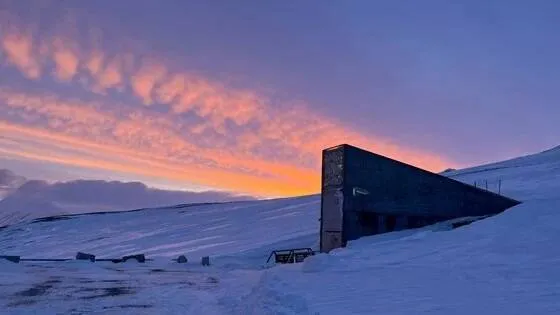The Svalbard Global Seed Vault is about securing the foundation of our food supply.
Today, this seed depot accepts 40 new seed samples from nine depositors. These are seed collections from Latvia, Morocco, Taiwan, USA, Holland, Israel, Poland, Zambia and Italy.
Located 120 meters inside the arctic slope of the Svalbard mountain, the Global Seed Vault is also the world's largest collection of crop diversity in one place. It is also insurance for the world's food supply. Permafrost and thick rocks keep seed samples frozen even in the event of a power loss, preserving millions of seeds representing important crop varieties from around the world.
Today's largest deposit comes from the United States Department of Agriculture (USDA), which has been sending a double security of seeds since the Depot opened. Their deposit includes 20 samples from 300 species and subspecies of cultivated plants.
Also read: On June 14, phones across Norway will beep and vibrate
Food security for future generations
“The preservation and use of local seeds is crucial to protecting local food production. Each time a new seed is deposited in Svalbard, it strengthens global food security for the future. Small-scale farming accounts for 75% of the world's cultivated area, and in developing countries, small-scale farmers produce 80% of all food products. Paradoxically, it is small-scale farmers who are most at risk of famine in many countries, says Sandra Borch, Norway's Minister of Agriculture and Food.
“Crop diversity is a unique source of new adaptive traits that can provide resilience to today's and future agricultural challenges. Under no circumstances should we put it at risk, says Athanasios Tsivelikas of ICARDA. – We strongly believe in the crucial role that the Svalbard Global Seed Vault plays in the food security of future generations.
More depositaries
The International Center for Agricultural Research in the Dry Areas (ICARDA) will secure nearly 9050 samples of 145 species and subspecies, including cereals and legumes, making this deposit the second largest.
The third largest deposit in June comes from the World Vegetable Center. It secures almost 8550 samples from 178 species of vegetables, aromatic and medicinal plants.
– Seeds stored in gene banks are at risk. There are uncontrollable factors such as war, fire and mechanical failures that can lead to seed loss. Storing backups outside of the country of origin can effectively mitigate these risks. This makes the Svalbard Global Seed Vault the key to protecting our heritage for future generations, says Maarten van Zonneveld, Genebank Manager at the World Vegetable Center.
The Institute of Biological Sciences and BioResources from Italy will deposit 392 samples of two types of wheat.
“We are pleased to be able to back up our oldest collection, dating back to our first missions in the 70s, when many of these accessions died out. Protecting agricultural biodiversity is fundamental to the future of humanity, which depends on agriculture and food. Preserving and making seeds available to scientists and breeders is becoming an increasingly important and urgent need, says Gaetano Laghetti of the Institute of Biological Sciences and BioResources in Italy.
Anyone can visit the Svalbard Global Seed Vault virtually
The Svalbard Global Seed Vault is owned by Norway. It is managed in a partnership between the Norwegian Ministry of Agriculture and Food, the regional gene bank NordGen and the Crop Trust. As 2023 marks the 15th anniversary of the seedbank, this year the partners opened their doors to the world through a new virtual trip. This enables a global audience to experience the inside of the Svalbard Global Seed Vault.
A complete list of the nine depositories that provide rare varieties seeds to the Svalbard Global Seed Vault on the occasion of its 15th anniversary, can be found below:
| Genetic Resource Center of the Latvian National Forestry Research Institute "Silava" | Latvia |
| International Center for Agricultural Research in the Dry Areas (ICARDA) Morocco | Morocco |
| World Vegetable Center | China-Taiwan |
| Institute of Biological Sciences and BioResources | Włochy |
| United States Department of Agriculture (USDA) | USA |
| Genetic Resource Center (CGN) | The Netherlands |
| University of Haifa | Israel |
| Ihar | Poland |
| SADC Plant Genetic Resource Center (SPGRC) | Zambia |
Source: regjeringen
Photo: Entrance to the Svalbard Global Seed Vault in the morning sun on the 15th anniversary. 28.02.2023/Ministry of Agriculture and Food
Like us on Facebook and share our post with others. Thank you.
Read also: The EU thanks Norway for its assistance with the medical evacuation



